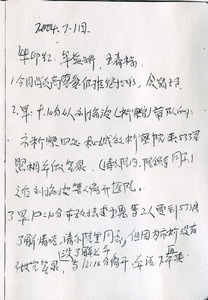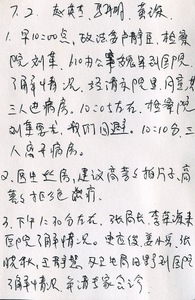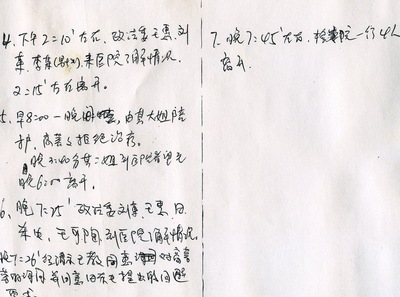(Minghui.org)
Continued from Part 3
Ten years ago, guards shocked Ms. Gao Rongrong on the face with electric batons for over 7 hours. When they finally stopped, blood and hair stuck to her burned skin, and blisters erupted on her face and neck. This series revisits the horrors of Ms. Gao's case from the perspective of her family members.
Ms. Gao was confined to a heavily guarded hospital ward for almost five months until she was rescued by a group of Falun Gong practitioners, only to be captured again six months later. She died of subsequent torture on June 16, 2005. She was 37.
Ms. Gao Rongrong has become a well known example of the Chinese Communist Party's persecution of Falun Gong, a self-cultivation practice based on the principles of Truthfulness-Compassion-Forbearance. Her only “crime” was persisting in her belief in Falun Gong.
More than nine years have passed since her death, yet the persecution of Falun Gong has not abated. Her two older sisters, now living outside of China, share their family's pain with the public in hopes that more people can see through the Chinese Communist Party's brutality and stand up against the senseless persecution.
In this four-part series, the Gao sisters detail the events that transpired between May 14, 2004, the day they discovered their younger sister's torture, and June 16, 2005, the day their sister passed away.
Part 4: Appeal for Justice for Rongrong Leads to Harassment of Our Family and Her Eventual Death
City Procuratorate In League with the Labor Camp
An informant had told us that there was a city Procuratorate that monitored the forced labor camp that Rongrong was in, and if we wanted to submit an appeal, that was the place to send it.
Finding the Procuratorate wasn't easy – in fact, it was almost like they didn't want to be found. But we managed to send in our appeal nonetheless, and were granted an appointment with the officials there.
The appointment wasn't very productive however. The officials seemed most interested in the fact that we mere citizens were able to contact them directly, and asked many questions about who we asked and how we knew about them. They showed no sympathy for our sister's plight, and it would have been less a waste of time if they had just ignored our appeal.
We knew that some of these officials were the same ones that manned the forced labor camp year-round, so we had expected some resistance. But they managed to surprise us by turning this consultation against us.
They interrogated us threateningly, and demanded to know if we too were Falun Gong practitioners.
Weiwei replied evenly, “Yes, we are Falun Gong practitioners. We believe in the principles of Truthfulness-Compassion-Forbearance. Is that a bad thing?”
The interrogating officer lowered his head and remained silent.
We left feeling very sad, both at Rongrong's situation and the officer's reaction. Was he doing this for his own gain, or was he, like countless others, deceived by the Chinese Communist Party's lies?
Provincial Procuratorate Refuses to Accept “Falun Gong Cases”
Since the city Procuratorate was deaf to our pleas, we had to appeal to a higher Procuratorate – the Liaoning Provincial Procuratorate. Unsurprisingly, we were stopped at the registration office because they “weren't allowed to accept any cases regarding Falun Gong.”
We adamantly refused to leave, and promised to stay there until a sympathetic worker called the procuratorial supervision office for us. This summoned an official, who listened to our story patiently and told us that although he couldn't directly accept cases having to do with Falun Gong, he could help us find ways around that.
With his help, we finally registered Rongrong's case with the Liaoning Provincial Procuratorate for processing. But we were later referred back to the Shenyang City Procuratorate.
City Level Procuratorate Redirects Case to Provincial Level
Thankfully, the official we spoke to at the Shenyang Procuratorate was a kindly man. He said that examining our sister's injuries wouldn't be a problem. But if we wanted Rongrong's case to receive serious attention, he told us that we shouldn't have the Procuratorate itself do the examination, because then the case would only remain on the city level.
He suggested that we instead submit an injury examination application to the Shenyang City Procuratorate, which will invite experts from the Liaoning Provincial Procuratorate to do the examination themselves, thus making this a provincial-level case, where it will get the attention it deserves.
Provincial Level Official Attempts to Withhold Case
We were only allowed to enter the Liaoning Provincial Procuratorate once – when Qin Chunzhi, head of the procuratorial supervision department in the Procuratorate, called us to his office.
Mr. Qin had left an impression as a brusque man, making sure to position himself as far away from us as possible when we came into his office.
Waving the picture of Rongrong's scorched face in his hand, he said to us, “Don't record anything I say, understand? Leave Gao Rongrong's case to me, and don't take this case anywhere else. I've handled cases for the deputy mayor before. You don't need anyone else.”
At that time we didn't understand what he meant, exactly. We thought this meant that he would at least initiate some form of investigation into Rongrong's case – surely for a man as powerful as he, this was no difficult task.
During that period, Rongrong was first transferred from Longshan Forced Labor Camp to the Military General Hospital, then to the Police Hospital, and later to the First Hospital Affiliated to China Medical University.
Throughout the entire process, she was under the forced labor camp's surveillance. Everything was recorded and rather transparent, so a public investigation would not have been hard to conduct.
But after a period of inaction, we came to realize that Qin Chunzhi just wanted to silence us, and stop Rongrong's case from going anywhere else. His higher-ups from the Political and Judiciary Commission and 610 Office had told him to do so, and who was he to disobey?
Legal Examiner Decries: “You Guys Are Nazis!”
On July 1, 2004, four officials from the Shenyang City Procuratorate and the Shenyang City Procurator's Office went to the hospital where Rongrong was being held to investigate her case. They took many notes and photos of Rongrong.
Several young people on the investigative team were shocked to see Rongrong's condition, and felt great sympathy for her. One young lady had to lift up Rongrong's hair for a picture, but it stuck to her ears and neck due to the blisters present from the electric shocks.
The young lady touched Rongrong's hair gently and said, “I'm really sorry – I hope that didn't hurt too badly! I just have to get a clear picture of your neck for the case. Just one.”
After she was done, she took off her hair clip and used it to put up Rongrong's hair.
A young man who was holding the spotlight made great efforts to stand close to Rongrong to light her injuries while making sure not to touch her injured legs and feet.
On July 8, 2004, the Shenyang City Procuratorate invited doctors from the Liaoning Provincial Procuratorate to examine Rongrong's injuries and collect evidence. As soon as the doctors entered the ward and saw the white dots on Rongrong's ankles and hands, they became furious.
Then they saw Rongrong's scorched face and neck, and had enough. And it's only reasonable – one could hardly discern Rongrong's features from the rest of her face. Her skin was peeling off in multiple layers at a time. It was a wonder that she could see anything; her eyes were small slits on her face.
One of the head doctors rushed out of the ward immediately to confront the police on duty in the corridor.
“You guys are Nazis! Torture is a filthy, decrepit relic of the Cultural Revolution, not of today's society! How could you possibly do this? What could she possibly have done to deserve this?” he cried.
Everyone involved in the investigation was appalled by the cold-blooded, ruthless torture that had happened to our sister. Young and old, experienced and inexperienced alike were deeply angry and upset by Rongrong's treatment.
No one could believe that cruel and unusual punishment of this magnitude deserved to be inflicted on anyone, and especially not a good person whose only “crime” was following the principles of Truthfulness-Compassion-Forbearance.
The doctors told us, “Once the result of injury examination comes out, Rongrong should be released and return home. They can't possibly let her stay with these criminals while she's recovering from injuries this severe. Those criminals will be dealt justice – disfigurement is as serious a crime as rape, and worthy of capital punishment.”
Harassment During and After the Investigation
From the day we found out that Rongrong's face was disfigured due to torture, we were placed under the watchful eye of the PLAC and the 610 Office. We were often just a moment away from danger.
It was futile trying to seek justice – all the governmental and judiciary agencies are ordered not to deal with Falun Gong issues, and the censorship from the media also barred them from helping us.
To prevent us from publishing the investigation results of Rongrong's injuries, staff from the Shenyang 610 Office and Political and Legal Affairs Committee (PLAC) frequented the hospital on July 1-2, 2004. They aimed to harass her and block other people from visiting her. Oddly enough, this matched up with the time of the Procuratorate's investigation.



 Guard from Longshan Forced Labor Camp assigned to monitor Rongrong logged the frequent harassment on her on July 1-2, 2004.
Guard from Longshan Forced Labor Camp assigned to monitor Rongrong logged the frequent harassment on her on July 1-2, 2004.
During the investigation, staff members Wang Hui and Liu Ge asked us questions for their notes. They wanted to know how we obtained Rongrong's photos, and who took them.
X-ray films from Rongrong's physical examination also mysteriously disappeared one night, while policewoman Wang Chunmei was on duty in the room. We eventually found them in the police's cabinets, hidden away to be destroyed.
They also spoke with Rongrong. When she told them that five other practitioners at the Longshan Camp had been shocked with batons just like she was, they ignored her comment.
Liu Ge returned with Lu Jingchen from the PLAC and Wei Jun from the 610 Office on the next morning. They told Rongrong that “the city leaders had paid special attention to her case.”
They came back in the afternoon again with another leader from PLAC, Mr. Li. While talking to Rongrong, Li tried to tear the scabs off of Rongrong's face. We stopped him before he could, and they left the hospital in a hurry.
Liu Ge and Wang Hui came to the hospital for the fourth time in the evening and demanded our personal information. We refused to tell them, and they became very upset.
During this time, strange people had come into the ward to stand over Rongrong's bed. When we asked who they were, they left without saying anything.
From then on, every aspect of Rongrong's life was under constant watch. Guards from Longshan Forced Labor Camp were stationed in Rongrong's hospital room around the clock, and also patrolled the hospital's hallways. They talked sarcastically to Rongrong and make fun of her injuries.
Everyone who visited the hospital had to undergo an ID check. Rongrong's home was also put under surveillance.
The guards and police officers, probably sick of their patrolling, often asked the doctor, “When will she die?”
But we needed to do our own patrolling too, it seemed. One night, when we had left the ward, policewoman Wang Chunmei began shaking Rongrong's weakened body and yelling at her.
Wang also told her partner Su Zhizhong to remove Rongrong's facial scabs – if we had gotten there any later, he probably would have.
We told Wang that we would press charges if she tried anything else.
To add insult to injury, Liu Bo from the Bureau of Justice, and Li Fengshi, the chief guard at Longshan Forced Labor Camp, put the hospital's management under pressure not to release any of the medical information about Rongrong.
Rongrong's Rescue
Many local Falun Gong practitioners were worried for Rongrong, and tried to come to the hospital to see her, quietly showing their support.
A female practitioner had sneaked into the ward to see Rongrong while the guard was out of the room, and after she saw how badly Rongrong had been abused, didn't want to leave her.
When guard Su Zhizhong came back, and saw that Rongrong had a visitor, he beat and verbally abused the practitioner. He took her to the hospital's security department, and we don't know what happened to her after that.
However, on October 5, 2004, some local Falun Gong practitioners managed to rescue Rongrong from the hospital – a place that had kept her prisoner for nearly five months.
And the 610 Office responded accordingly. They left virtually no stone unturned regarding Rongrong. Our entire family, as well as our workplaces, were harassed about the Rongrong's whereabouts.
An RV was stationed outside our parents' home in Shenyang, and guards remained there all day and all night, to keep track of our parents. The neighbors later told us that the guards even screened their mail every day, and some guards stood guard outside our parents' door.
For our safety, we never returned to Shenyang again.
To prevent Rongrong being sent abroad, the top communist Party leaders Jiang Zemin, Luo Gan, and Zhou Yongkang – the same people responsible for the entire persecution – had ordered Shenyang authorities to form a special task force to search for Rongrong.
A local radio station even broadcast a public notice, stating, “A young female named Gao Rongrong has been abducted, and the Bureau of Justice is looking for her on behalf of her parents. If anyone sees her, please report her to the police. Her parents are offering a reward for any information on her.”
Police stations, train stations, public transportation departments, and neighborhood committees in nearby cities and counties all received notice from Shenyang Bureau of Justice to keep an eye out for Rongrong as well.
Final Arrest and Death
Rongrong, and the practitioners who helped her, managed to stay out of sight, but not for long. They were found and arrested again on March 6, 2005.
Our parents found out that Rongrong was taken to the notorious Masanjia Forced Labor Camp. However, they hadn't told us about this because they didn't want us to be involved in this issue. This was the second-to-last time we would ever hear from her.
On June 16, 2005, our sister Gao Rongrong was persecuted to death.
We don't know what happened to her in her last three months, except that she had been kept alone. Our parents went to the labor camp many times, but they were never allowed to see Rongrong.
Su Jing, the labor camp head, even told them that Rongrong was doing well. When our mother insisted that she see for herself how well Rongrong was doing, Su Jing ordered local police to arrest her.
We also heard that Luo Gan, former head of the 610 Office, had ordered the local authorities to handle the case discreetly, and censor information about the persecution that Rongrong had suffered.
Zhou Yongkang, former Minister of Public Security, even came to Shenyang to personally orchestrate the arrest and further persecution of Rongrong and her rescuers.
After Rongrong died, the Procuratorate turned in all the documents about her to PLAC. The 610 Office also took Rongrong's profile from her workplace, the Luxun Academy of Fine Arts. Rongrong's identity was effectively eliminated.
We never got to see Rongrong's body; the authorities had disposed of it almost immediately.
Epilogue
Writing this article was not easy for us – to this day, recalling these events in any way, shape, or form brings back the constant terror, pain, and pressure that we underwent during that time.
Rongrong was brave. She had used her own life to show the world the brutal, ugly truth behind the Communist regime in China.
Perhaps these perpetrators will never understand why Rongrong was so persistent in her beliefs. But few things can move a person once they find their true faith.





